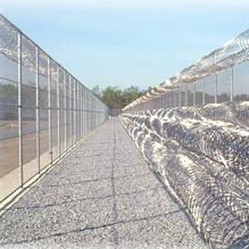I want to make clear on this page that, in designing a criminal justice system, I want the #1 priority to be preventing crime and ensuring the safety of all citizens.
Some people think about retributive justice, like the idea of making someone pay for their crime, or getting revenge on someone who has wronged them. I don't like this idea. For one, it conflicts with my religious beliefs, which you can read about here. This idea also seems primitive and it often seems to devolve into anger, hate, and demonizing people who commit crimes.
I know people who have been to jail. One of my friend's husbands took his own life while in jail, leaving her as a single parent. In this case, his psychiatric medication had been withheld from him, by the prison staff. These sorts of abuses are common in American prisons. I think it is important to view people who commit crimes--even those who are legitimately guilty--with compassion, and work to heal them, and protect them from harming other people as well as themselves.
I tend to see people who commit crimes as people who are not necessarily bad people, but who have made bad choices. I want them to be held accountable for their actions, but I don't want them to be made to suffer unnecessarily.
I want the justice system to keep society safe, keeping people who are at risk for harming others safely locked up, but I don't want these people to be treated harshly, and I want the justice system to help give them options and help them to grow as people so that when they are released, they have good options and make good choices.
I think this is the best way to prevent crime.






 The Shaming of Femininity and Elevation of Masculinityon 07/13/2017
The Shaming of Femininity and Elevation of Masculinityon 07/13/2017
 What is Genderqueer or Non-Binary Gender?on 10/16/2015
What is Genderqueer or Non-Binary Gender?on 10/16/2015
 Resources for Learning Spanish Free Onlineon 04/13/2016
Resources for Learning Spanish Free Onlineon 04/13/2016
 Ways Native Plants Can Help Control Invasive Plantson 05/26/2016
Ways Native Plants Can Help Control Invasive Plantson 05/26/2016


Comments
Thank you all! I find the analogy to health interesting; I hadn't thought of that when I was writing this article, but now that you mention it, frugalrvers, I think it makes a lot of sense.
I think both are examples of how holistic thinking (looking at the big picture) leads to different approaches to problems. I think that the analogy you suggest between incarceration and treating symptoms is actually a pretty deep one that rings true with me on a lot of levels. Like...if it gets to the point that someone has committed a crime and ends up in jail, something has already gone wrong--and it would be better (and less costly) to intervene earlier and prevent the crime from being committed in the first place. Putting someone in jail also doesn't usually repair the harm done by the original crime.
It seems really similar to the approach of intervening very late in a medical condition where you can't really solve it--vs. catching something very easy where you can treat it or prevent it entirely, with an effective, low-cost solution...things like catching and removing pre-cancerous cells, or preventing people from getting sick by promoting overall health. I'm a huge fan of preventative health!
This is a fantastic, thought provoking article...
It reminds me of the way conventional medicine is handled, too...we're always investing energy and money into the wrong side of the equation...AFTER illness (suppressing or fighting symptoms) vs taking steps to prevent it.
This is certainly a complex topic! Thank you for tackling it, and for expressing some very valid points. We do need to protect society, but we can't just lock people away and forget about them. I totally agree that prevention of crime would be the best solution!
Alex well done and welcome to wizzley. I believe we all agree, convicting and incarcerating an innocent person is never a good thing. On the other hand, I can’t help but ask, how many guilty of serious crimes are never brought to justice. Then again, I believe your broader point. What is true justice anyway, and can we, or are we as a society willing to solve the problems turning folks to take part in criminal activities?
Be well, teddletonmr
I actually agree with your comment about my poll, and I was thinking about it and I think it would easier for me to remove it at this point because I'm not sure it's the best question to ask in a poll.
I like this article in general. I think your poll about innocent people in jail is limiting - it presents two very specific viewpoints, and I think it's easy for someone not to agree with either one. I'm leaning towards the idea that it doesn't matter so much whether or not the people in jail are innocent, they still need to be treated well, because they're people. I don't think they "deserve" any kind of treatment based on what they've done or haven't done.